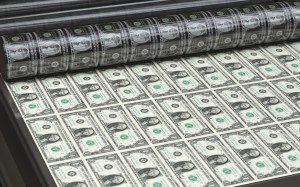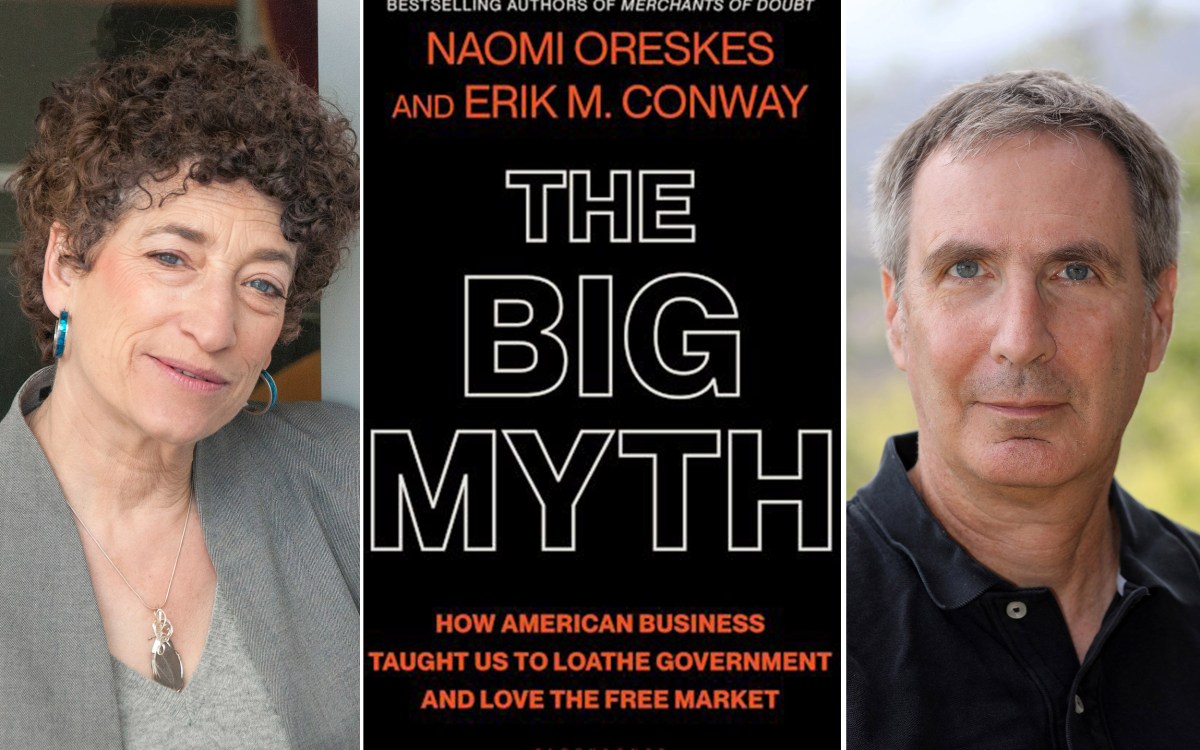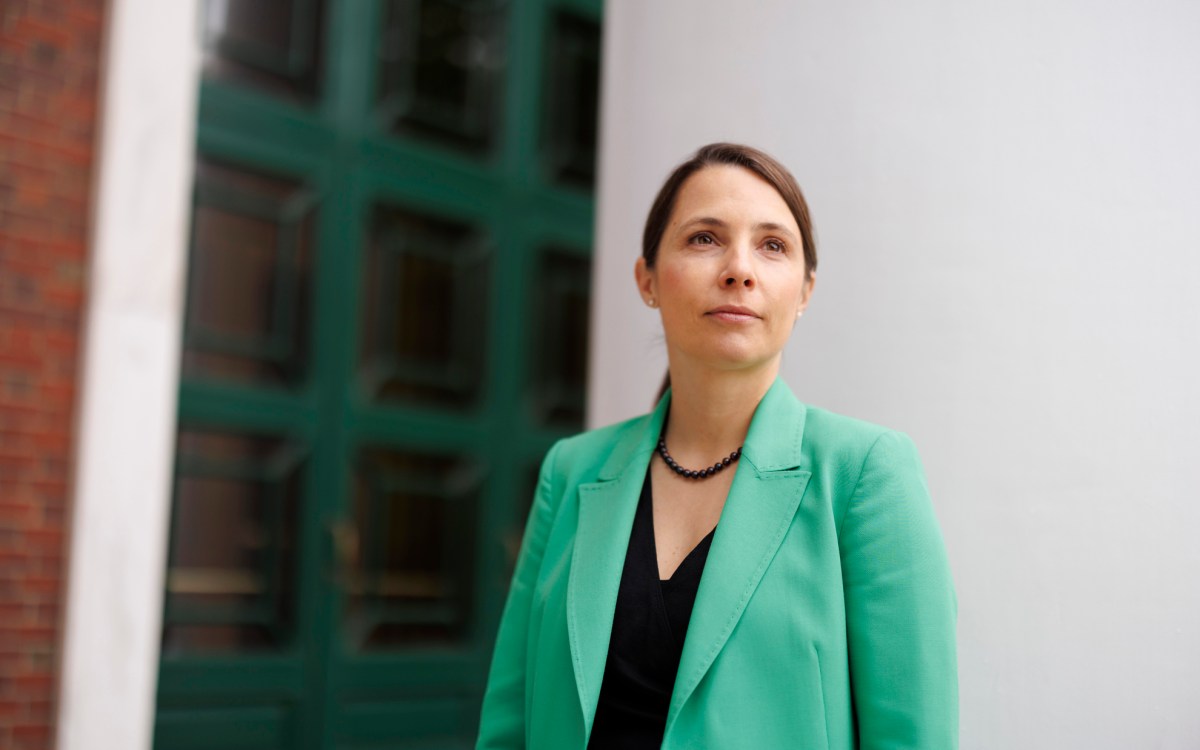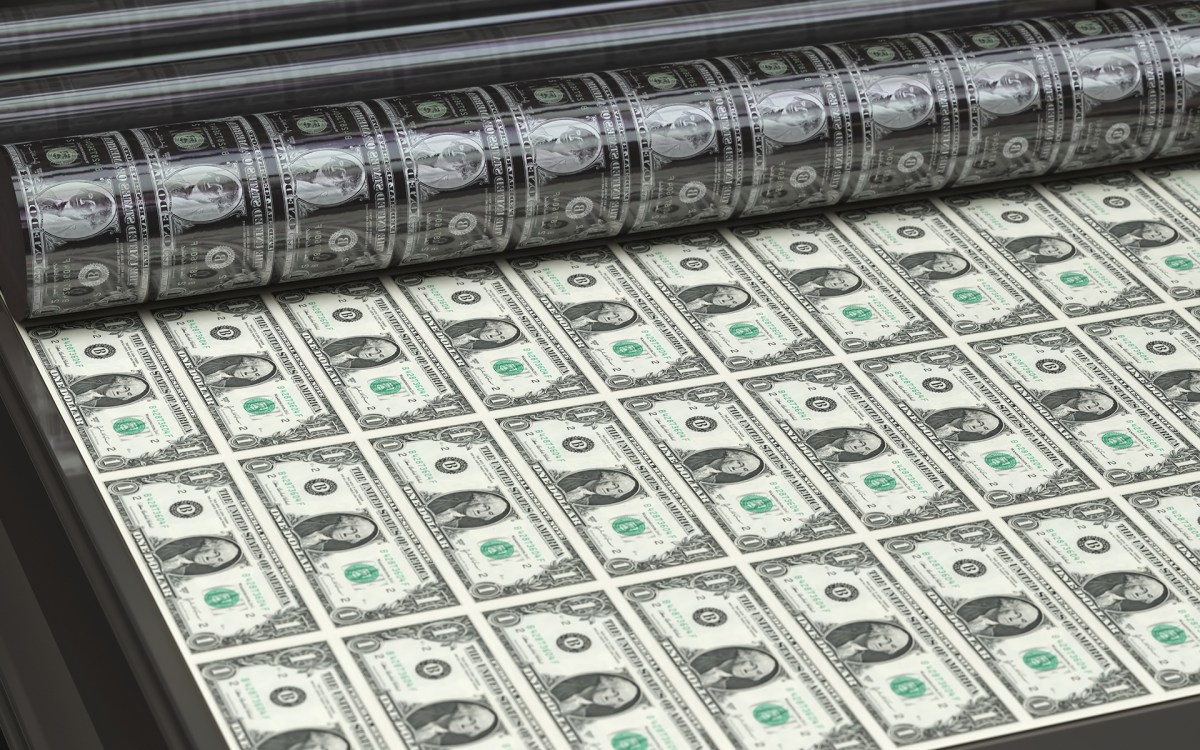High point for market fundamentalism? Would you guess Clinton?
Naomi Oreskes traces decadeslong campaign to get Americans to put their faith in free market as force for positive change over government
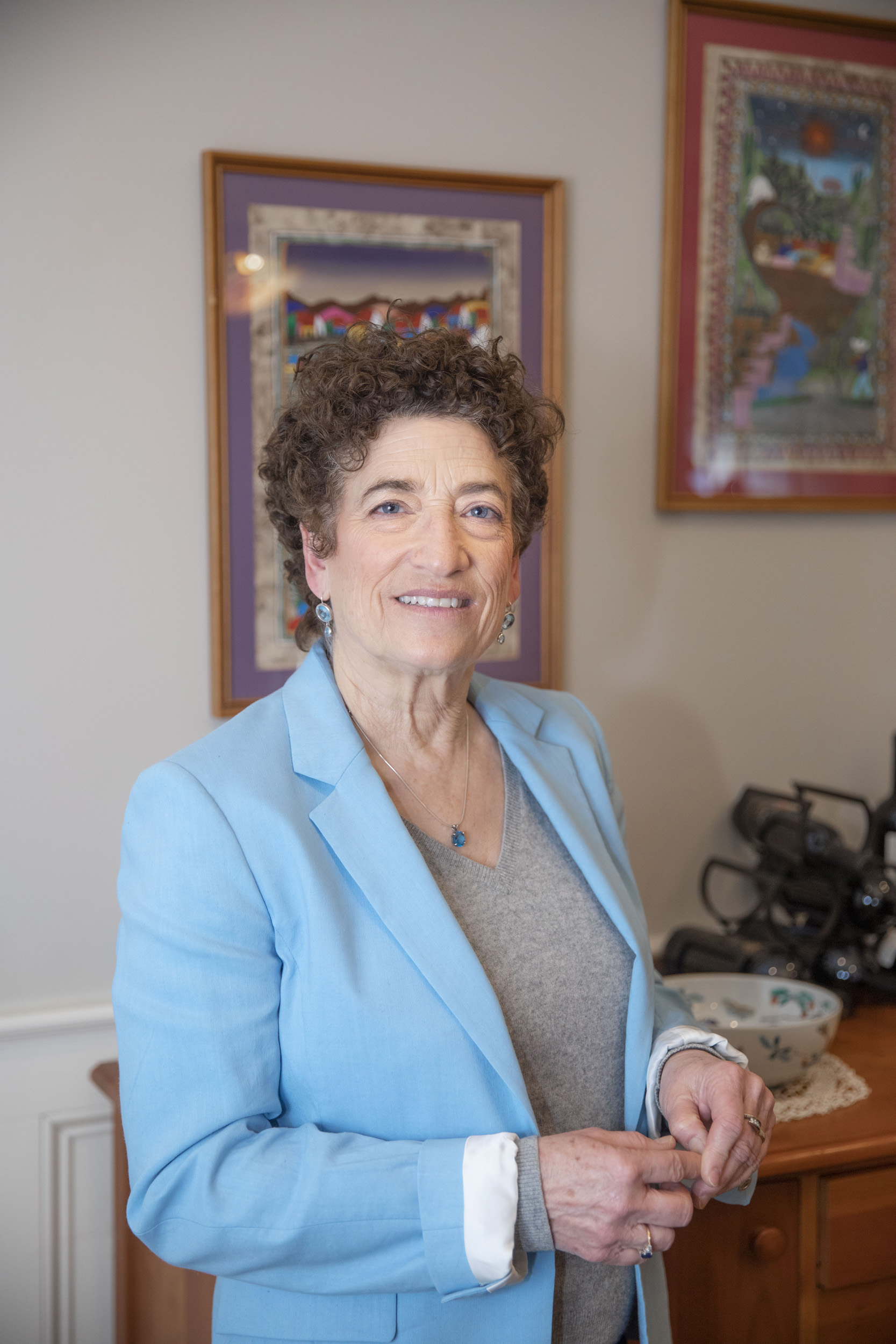
“Climate change is a classic market failure. This is when a legal activity like selling fossil fuels creates costs that are not reflected in what we pay,” said Naomi Oreskes.
Kris Snibbe/Harvard Staff Photographer
Americans were largely distrustful of Big Business at the start of the 20th century. By the 1980s and ’90s, they had decided that the problem wasn’t Wall Street, but Washington. According to Naomi Oreskes, the Henry Charles Lea Professor of the History of Science and Affiliated Professor of Earth and Planetary Sciences, that flip was the result of a decadeslong propaganda campaign, masterminded by wealthy industrialists in their own self-interest. In “The Big Myth: How American Business Taught Us to Loathe Government and Love the Free Market” Oreskes and co-author Erik M. Conway uncover how free market absolutists inserted their ideas and values into 20th-century politics, religion, culture, academia — and ultimately the national psyche. The Gazette spoke to Oreskes about how the fallout is hampering America’s ability to deal with major challenges, including climate change.
Q&A
Naomi Oreskes
GAZETTE: Your 2010 book “Merchants of Doubt” exposed how a small group of scientists obscured the facts on cigarette smoke and climate change in the late 20th century. You write that “The Big Myth” isn’t so much a sequel as a prequel to the earlier book. How so?
ORESKES: We go back further in time. When we finished “Merchants of Doubt,” we felt we had demonstrated beyond any reasonable doubt that climate change deniers weren’t motivated by questions about science. They were motivated by political questions about the appropriate role of government and anxieties borne out of the Cold War. They worried government regulation was a backdoor to communism. What we were left with was: Why would intelligent people accept what we call market fundamentalism? Especially because its basic arguments are refuted by the facts of history.
GAZETTE: Tell us how market fundamentalists got their start.
ORESKES: The story begins in the early 20th century with big battles over child labor and workplace safety. Most Americans today don’t realize how incredibly dangerous American capitalism was back then. One in 1,000 workers died or was severely injured in the workplace every year. That would be the equivalent of 1.5 million people today. Why were there so many more accidents in the United States than in Germany or the United Kingdom, which were comparatively industrialized? The answer people came up with was workmen’s compensation, which created incentives for business owners to make the workplace safer. There were people in the business community, like Andrew Carnegie, who supported it. But many opposed it. The National Association of Manufacturers (NAM), a key player in our story, argued that this was an infringement on the freedom of businesses — businessmen — to operate as they saw fit.
GAZETTE: Why would they demand rights for individual, often wealthy, men but not workers at large?
ORESKES: One of the questions Erik and I always grapple with is: How did this make sense to the people we’re studying? One of the things we see, particularly in the 1930s, is they don’t believe in equality. We see this particularly in the writings of someone like Rose Wilder Lane or Noel Sargent, who was the secretary of NAM.
GAZETTE: Speaking of Rose Wilder Lane, you have some revelations about “Little House on the Prairie.”
ORESKES: Turns out, the “Little House” books were fabrications. First of all, Laura Ingalls Wilder didn’t write them. She wrote rough notes for events that happened in her life. They were crafted into stories by her daughter, Rose Wilder Lane, who was a leading libertarian thinker and friend of President Herbert Hoover. Lane crafted the books as power parables about the success of the nuclear family through the dint of hard work and love, particularly patriarchal love, and without help from government. Second, it turns out the family was not successful. The true story was one of repeated failure, disappointment, and problems. Third, the federal government played a huge role in their lives. As white settlers, they wouldn’t have been there if not for the Homestead Act and Native American removals.
GAZETTE: Let’s talk about the transformation of President Ronald Reagan.
ORESKES: How did Reagan go from being not exactly a failed actor — but he made some pretty second-rate movies — to entering politics at a high level? The answer is found in the General Electric Corp. In the 1950s, they recruited Reagan to host a television show called “General Electric Theater.” I spent a whole day at the Reagan Library watching it, which was kind of fun. I remember one story involving an alcoholic. His family encourages him to get help, but he won’t. Finally, he says, “No, I’ve got to fix this on my own. Nobody else poured that alcohol down my throat!” It’s a view of alcoholism most wouldn’t agree with today, but it’s a typical story for “GE Theater”: That success rests entirely in our own hands. And it was successful — one of the top three programs in the late 1950s.
Hosting “GE Theater” was only half of Reagan’s job. The other half was going on the lecture circuit and promoting the GE ideology, which was extremely anti-union and anti-government. During this period, Reagan is transformed. He goes into GE a Democrat; he comes out an anti-government Republican. Working with GE in effect creates Reagan Republicanism.
GAZETTE: Is there a point in time when we see market fundamentalism really triumph?
ORESKES: It’s in a place that might surprise some readers, which is the Clinton administration. One of the things we show is that the phrase “big government” is part of this propaganda campaign. Back in the ’30s, NAM and its allies recognized that a lot of Americans hated big business. The notion of big government was consciously introduced as a means to shift people’s attitudes. Clinton buys into this with his famous line: “The era of big government is over.” And he institutes a number of reforms, including, crucially, the deregulation of telecommunications and financial markets. We think the evidence is clear that deregulation of financial markets was a catastrophe because it led directly to the 2008 financial collapse.
GAZETTE: Fast-forward to today: You write that we can’t rely on the private sector to solve climate change. Why?
ORESKES: Climate change is a classic market failure. This is when a legal activity like selling fossil fuels creates costs that are not reflected in what we pay. Nicholas Stern, former chief economist of the World Bank, has called climate change the largest market failure in history. According to the International Monetary Fund — which is not exactly a left-wing organization — climate change costs the world over $1 trillion every year in damage to property, health effects, and other adverse effects. That’s $1 trillion passed on to us — the taxpayers, the consumers.
GAZETTE: What does Massachusetts tell us about the big myth?
ORESKES: Republicans love to hate Massachusetts; they call it Taxachusetts. But guess what! Massachusetts works really well. It’s highly educated. People have good jobs. People are able to pay their taxes. And our taxes go to things we like, like good schools and roads and excellent medical care. The reality is, people don’t thrive when everything is left to the market. People thrive when there’s an appropriate balance.


